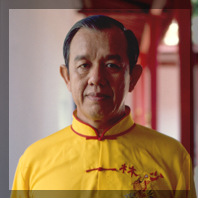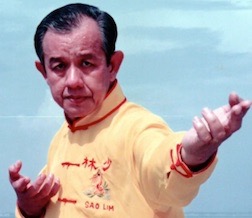MASTER P’NG CHYE KHYM
 Master P'ng Chye Khym, born in 1939 in a small village on the Malaysian island of Penang.
Master P'ng Chye Khym, born in 1939 in a small village on the Malaysian island of Penang.
As a teenager, he began to play boxing with a local fighter.
From that moment, his passion for the fighting arts and his passion for training led him to practice various Chinese and Malay combat systems. In 1956, he met the Buddhist monk Sik Koe Chum freshly landed in Penang; it is now under his aegis that he will study Sao-Lim Hood Khar Paï and Chinese medicine. .
On May 16, 1960, Reverend Sik Koe Chum died; it is his oldest student, Ch'ng Kek Hock, who replaces him, but shortly thereafter he is called as a bodyguard to the Sultan of Kuala Lumpur. Therefore, it is Master P'ng Chye Khym (49th generation Sao-Lim Hood Khar Paï), who is responsible for transmitting the teaching of Sao-Lim Hood Khar Paï in the "Sao-Lim Athletic Association of Penang. Despite his faith in this system and his great respect for the late master Sik Koe Chum, Master P'ng believes he needs to study other combat systems to get even closer to the essence of his art. .
Penang being at this time a real crossroad for itinerant martial arts masters, Master P'ng meets many, both in Shaolin, Taïchi and Hsing-I styles.
Its very modest origins compel Master P'ng to work hard to meet the needs of his family and to pay his teachers, who often pass on their knowledge at a high price.
However, these peregrinations attract him the wrath of his peers who see there a betrayal.

The father of a family of four, an influential public figure, he has been honored by the Malaysian government on several occasions and enjoys a high social status.
A renowned Chinese traditional doctor, he receives every day a crowd of patients ready to stand for hours during the tropical humidity in his waiting room. Despite his undeniable socio-professional success and his great achievement in the fighting arts, Master P'ng remains a deeply honest, humble and compassionate man - something as exceptional in the East as in the West. Contrary to what one might think, he remains deeply attached to the traditional approach of the fighting arts; he never ceases, however, to repeat that tradition is not an idol but a tool, which, with hard work, can lead the individual to a very high degree of accomplishment.He died on December 31, 2010, plunging his family and all those around him into consternation.
If no one today can reasonably claim to have collected all the knowledge of this great man, many have benefited from his teaching and strive to honor his memory by building this legacy.
Despite his faith in this system and his great respect for the late master Sik Koe Chum, Master P'ng believes he needs to study other combat systems to get even closer to the essence of his art.
Penang being at this time a real crossroad for itinerant martial arts masters, Master P'ng meets many, both in Shaolin, Taïchi and Hsing-I styles.
Its very modest origins compel Master P'ng to work hard to meet the needs of his family and to pay his teachers, who often pass on their knowledge at a high price.
However, these peregrinations attract him the wrath of his peers who see there a betrayal.
In the long run, however, Master P'ng is not only recognized as the repository of the authentic Sao-Lim Hood Khar Paï tradition, but also as an expert in Taïchi and Hsing-I - disciplines that have all significantly enriched his global understanding of fighting arts.
The father of a family of four, an influential public figure, he has been honored by the Malaysian government on several occasions and enjoys a high social status.
A renowned Chinese traditional doctor, he receives every day a crowd of patients ready to stand for hours during the tropical humidity in his waiting room. Despite his undeniable socio-professional success and his great achievement in the fighting arts, Master P'ng remains a deeply honest, humble and compassionate man - something as exceptional in the East as in the West. Contrary to what one might think, he remains deeply attached to the traditional approach of the fighting arts; he never ceases, however, to repeat that tradition is not an idol but a tool, which, with hard work, can lead the individual to a very high degree of accomplishment.He died on December 31, 2010, plunging his family and all those around him into consternation.
If no one today can reasonably claim to have collected all the knowledge of this great man, many have benefited from his teaching and strive to honor his memory by building this legacy.
By Dominique Falquet
Penang Saolim www.saolimpenang.com
